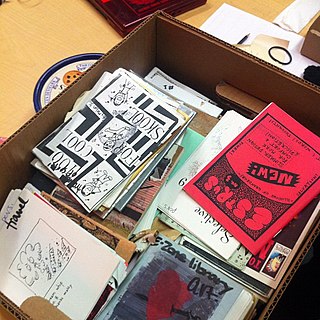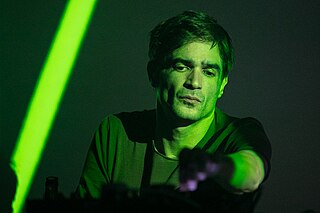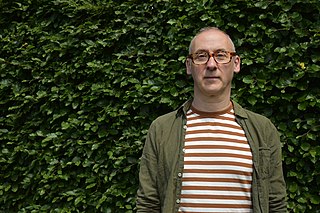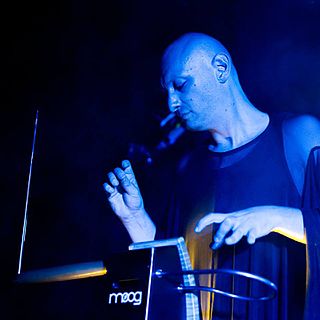
A fanzine is a non-professional and non-official publication produced by enthusiasts of a particular cultural phenomenon for the pleasure of others who share their interest. The term was coined in an October 1940 science fiction fanzine by Russ Chauvenet and first popularized within science fiction fandom, and from there the term was adopted by other communities.

A zine is a small-circulation self-published work of original or appropriated texts and images, usually reproduced via a copy machine. Zines are the product of either a single person or of a very small group, and are popularly photocopied into physical prints for circulation. A fanzine is a non-professional and non-official publication produced by enthusiasts of a particular cultural phenomenon for the pleasure of others who share their interest. The term was coined in an October 1940 science fiction fanzine by Russ Chauvenet and popularized within science fiction fandom, entering the Oxford English Dictionary in 1949.

The music of Australia has an extensive history made of music societies. Indigenous Australian music forms a significant part of the unique heritage of a 40,000- to 60,000-year history which produced the iconic didgeridoo. Contemporary fusions of indigenous and Western styles are exemplified in the works of Yothu Yindi, No Fixed Address, Geoffrey Gurrumul Yunupingu and Christine Anu, and mark distinctly Australian contributions to world music.

Christopher Robert Lionel Abrahams is a New Zealand-born, Australian-based musician. He is a founding mainstay member of experimental, jazz trio the Necks (1987–present), collaborated with Melanie Oxley as a soul pop duo (1989–2003), and has issued ten solo albums.

Broadcast were an English band formed in Birmingham in 1995 by Trish Keenan and James Cargill (bass). Their musical style blended elements of 1960s psychedelia with early electronic music and samples from esoteric sources; it earned the band a cult following.
Chapter Music is one of Australia's longest-running independent record labels. Chapter Music has worked with a broad range of mostly Australian artists, in genres such as rock and roll, indie pop, post punk, country and western and folk. Between 1992 and 2013, the label released around 45 titles, including several compilation albums, such as Can't Stop It! Australian Post-Punk 1978-82 and Songs For Nao. The label's 2014 roster features bands such as Dick Diver, Beaches and Twerps.

Architecture in Helsinki was an Australian indie pop band which consisted of Cameron Bird, Gus Franklin, Jamie Mildren, Sam Perry, and Kellie Sutherland. Before its hiatus, the band released five studio albums: Fingers Crossed (2003), In Case We Die (2005), Places Like This (2007), Moment Bends (2011), and Now + 4eva (2014). The band has been inactive since 2018.

Urb was a monthly American magazine devoted to electronic music, hip hop and urban lifestyle and culture. Based in Los Angeles, California, the magazine was founded in 1990 by Raymond Roker.

Oval is an electronic music group founded in Germany in 1991 by Markus Popp, Sebastian Oschatz, Frank Metzger and Holger Lindmüller. The group pioneered glitch music, writing on CDs to damage them and produce music with the resulting fragments. The project has been a solo venture by Popp since the departure of other members in 1995.

XLR8R is a website that covers music, culture, style, and technology. It was originally also a print magazine.

Jonathan Julian Hopkins is an English musician and producer who writes and performs electronic music. He began his career playing keyboards for Imogen Heap, and has produced but also contributed to albums by Brian Eno, Coldplay, David Holmes and others.

In Case We Die is the second studio album by Australian indie pop band Architecture in Helsinki which was released on 5 April 2005. It was produced by band members James Cecil and Cameron Bird under their other moniker, The Carbohydrates. In Case We Die appeared on the ARIA Albums Chart Top 100.
Julian Knowles is an Australian composer and performer, specialising in new and emerging technologies. His creative work spans the fields of composition for theatre, dance, film and television, electronic music, sound and new media arts, popular music and record production. Since the mid-1980s, he has established himself as a prominent artist in the area of electronic and new music, achieving significant critical recognition for his performances and recordings.

Anthony Peter Pateras is an Australian-born composer, pianist and electronic musician. He has released several solo albums and collaborated with other artists. Pateras has performed and recorded in Australia, North America and Europe. At the APRA Music Awards' Art Music Awards, he has been nominated three times: 2011 for Performance of the Year for his composition, Refractions, performed by Clocked Out and Speak Percussion; 2012 for Work of the Year – Instrumental for Flesh and Ghost performed by Speak Percussion; and 2015 for Performance of the Year for Beauty Will Be Amnesiac or Will not Be at All performed by Synergy Percussion.

Erdem Helvacioglu is an electronic musician from Turkey. He has collaborated with artists Mick Karn, Kevin Moore, John Wilson, Kazuya Ishigami, and Saadet Turkoz. He also composes music for theatre, film and multimedia productions, and produces for popular and rock music bands in Turkey. He has received numerous international awards including prizes from the Luigi Russolo and Insulae Electronicae Electroacoustic Music Competitions.

Jim Jupp is a producer, composer, and along with the graphic designer Julian House he co-owns the Ghost Box record label and manager of Belbury Music Publishing. He records as Belbury Poly. Jupp also runs his own music publishing business and small run record label, Belbury Music
Curse Ov Dialect is an alternative hip hop group based in Melbourne. It consists of Raceless, Volk Makedonski, Atarungi, and Paso Bionic. They are the first Australian hip-hop group to be signed to an American record label.
Dom Alessio is an Australian radio personality, music journalist and blogger. He is best known as the host of the Australian music show on Triple J radio, Home & Hosed

Miles Brown is an Australian theremin player, composer, multi-instrumentalist, producer, music curator and sound artist. Best known for his work with Australian instrumental electronic act The Night Terrors, Brown has also performed with Lou Reed, Laurie Anderson, Goblin, Black Mountain, Mick Harvey, Alexander Hacke, Danielle de Picciotto, Bardo Pond, Heirs and The Narcoleptor.

Opalescent is the debut studio album by English musician and producer Jon Hopkins, released on 30 June 2001 under Just Music and absolute zero. His only assistance in the album came from his friend and regular collaborator Leo Abrahams, who plays Opalescent's guitars.
















